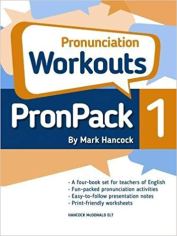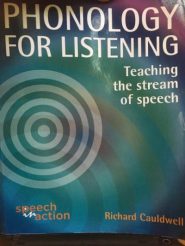Here’s my suggested reading list for the phonology component of the DipTESOL. I don’t want to mislead you – the course is 9 months long (depending) and you’ve a lot to do during that time. I’m not saying you should read all of them, but it’s worth getting hold of a few – particularly the classroom-focused ones. I shared a few articles in this recent post which might also be of interest.
Note: some affiliate links below. Views my own.
For the classroom
Star Buy: The Book of Pronunciation (Marks and Bowen)
I harp on about this so much – I really should be on commission. I’ve mentioned it elsewhere as my ‘if you only buy one book on pronunciation…’ so enough said. It’s very good.
Recommended: PronPack (Hancock)
I recently bought this 4-book set and will do a full review on the blog soon. You can’t fault this collection for the sheer volume of engaging, classroom-based ideas and slick photocopiable resources. It has some great activities to try out but it doesn’t come cheap. Plus, although it looks fancy I’d say it’s less accessible overall than the Book of Pronunciation.
If your budget allows…
You can get gist of what Hancock offers in PronPack if you pick up Pronunciation Games. If you can pick up a few older books online I’d recommend Bradford’s Intonation in Context. I have copies of English Pronunciation in Use kicking about but I’ve never found them much use if I’m honest – there is a (relatively) new edition out though. I wouldn’t invest money in a book like Ship or Sheep as I think it’s application is a bit limited, but if you see it collecting dust in the staffroom it’s worth flicking through. There seem to be plenty of examples online too. Primary Pronunciation Box is kicking about our staffroom as well – you know what you’re getting with that ‘Primary…Box’ series but I don’t teach YLs much so haven’t put the activities into practice myself.
If you don’t want to part with any extra cash but you want some more examples of practical approaches to pronunciation, the preview pages from Understanding English Pronunciation (Boyer) might help.
Bridging the gap
There are a few books that are useful for both theory and practical teaching ideas.
The usual suspect: Sound Foundations (Underhill)
This is guaranteed to appear on every DipTESOL reading list. That’s certainly warranted – it’s particularly good for helping you get to grips with the phonemic chart, and the mechanics of English sounds. Underhill’s Q and A section for DipTESOL trainees on his blog is pretty useful too.
A must read: Phonology for Listening (Cauldwell)
This is a fantastic read (review here). If only I’d come across it myself during the diploma! Cauldwell’s ideas (as with the aforementioned Bradford book) follow on from David Brazil’s work on discourse intonation, and Cauldwell provides some basic info and suggested reading on the topic through his blog (see here) as well as in the book. Anyway, Cauldwell’s book helped me understand more about what I should teach and why. Buy it!
Read and reflect: Pronunciation (Dalton and Seidlhofer)
Dalton and Seidlhofer’s book is really good for the whole self-reflection thing. Read a bit, do a reflective task, etc. The exploration section is the best bit. If you like learning by doing, then Section 3 of this book would be really useful. Note: my copy is old and still mentions tape recorders, which is kinda funny.
Dense but useful: Phonology in English Language Teaching (Pennington)
I’m not gonna lie, Pennington’s book is quite heavy-going. However, the concluding chapter on ‘Pronunciation and the language curriculum’ is very useful for DipTESOL trainees, and highlights various areas of consideration when teaching pronunciation or designing pronunciation materials for class.
Reference
My pick: An Introduction to the Phonology of English for Teachers of ESOL (Parker and Graham)
This is a very accessible book which I have previously recommended for those about to take a CELTA too.
The big debates…
If you’d like to familiarise yourself with important issues/debates/trends in teaching pronunciation, I’d say a grounding in English as a Lingua Franca is your best bet.
You could buy: The Phonology of English as an International Language (Jenkins)
From what I understand, this book was the first in which Jenkins laid out her priorities for the teaching of pronunciation, the ‘Lingua Franca Core’. I say you could buy this book – instead I would probably just visit Laura Patsko/Katy Simpson’s site to get a good overview of Jenkins’ ideas – particularly as there has been a lot more research since its publication (and the book is still expensive…). At the end of Laura Patsko’s recent webinar (reviewed here) she mentions Walker’s Teaching the Pronunciation of English as a Lingua Franca as a more recent book summarising research in this area (I can’t recommend that personally though so it’s not on my list!).
What I (personally) wouldn’t buy
Well you know, I’m not promoting anyone for any reason so I’ve got to be honest…
How to teach… Pronunciation (Kelly)
I picked up a free copy of this a while back in a library revamp at work. Compared to other resources I found it a bit diluted. I revisited it recently looking for content for my MA dissertation and felt the same. Views are my own though, it might work for others.
If you’re still in two minds about any of the above then there are plenty of previews available online.
Categories: DipTESOL tips

Thanks for the list and your insight. I did Delta not the Dip, but I did do a bottom-up listening lesson so obviously Cauldwell was my main text. But I also had to refer to a few pronunciation books for my essay – mostly Kenworthy (1987) it seems – and I’ve not even heard of many of these. I wish I’d had this list then!
I still need/want to work on my teaching of suprasegmental phonology, so bookmarking this page for when time/money allows, thanks.
LikeLike
Cheers Elisabeth. Did you enjoy the DELTA? Did they cover much about teaching pronunciation on the course?
That’s part of the problem with suggesting books: the cost! I rarely invest in new books these days, just can’t afford it. I wait for them to get discounted or for our centre to restock/revamp their Delta library, things like that.
LikeLike
Roach is my go to. PronPack/Pronunciation Games have good stuff but some of the activities are not my cup of tea. Sound Foundations is high quality and I read some Rogerson-Revell book recently – very good, and a Celce-Murcia one which was very comprehensive and very decent indeed. Can’t remember titles as I was reading for another purpose entirely!
LikeLike
Tim Graham (An Introduction to the Phonology of English for Teachers of ESOL (Parker and Graham)) was my tutor on the DipTESOL course at Sheffield Hallam. A great guy and a great book. As you say its very accessible. If i recall there is an activity on bilabial plosives where he encourages teachers to ask students to get lighters out to show the difference between voiced and unvoiced. At the end he says if it doesn’t work at least you will find out who smokes and you can borrow cigarettes off them at break time. Very naturally written and refreshing
LikeLiked by 1 person